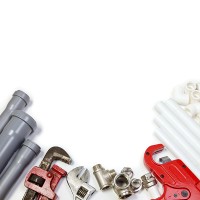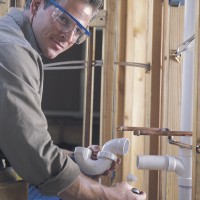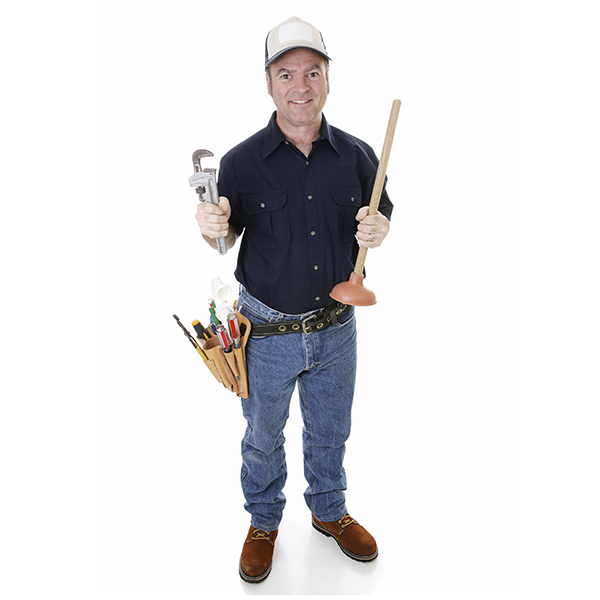Plumber
Being a plumber is not as easy as it may seem. It requires specialized training, as well as knowledge of building codes, water conservation techniques, construction and pipe materials, and the ability to correctly read blueprints. It requires many years of schooling and experience before you can become an independent plumber with your own business.
Education
 Studying to become a plumber begins in high school. You need a strong foundation in math (especially geometry and algebra), computers, and science. You should take classes in blueprint reading and drafting if your high school offers them. Some high schools may even offer vocational training, although most people will have to take these classes at a trade school or community college to earn a certificate in a course that covers drainage systems and water supply. You will then need to complete an apprenticeship program. These programs can be found across the country, including California (https://www.calapprenticeship.org/programs/plumber_apprenticeship.php) and Washington, D.C. (https://local5plumbers.org/apprenticeship.asp). Apprenticeship programs offer the most comprehensive training, providing at least 144 hours annually of classroom instruction and paid on the job training. They typically take 4-5 years to complete. After you have finished your apprenticeship, it is time to get a license. Once you are a licensed plumber, you can work independently and start your own business if you want to. To get a license, plumbers need to have between 2-5 years of experience and pass a test of local codes and plumbing trades.
Studying to become a plumber begins in high school. You need a strong foundation in math (especially geometry and algebra), computers, and science. You should take classes in blueprint reading and drafting if your high school offers them. Some high schools may even offer vocational training, although most people will have to take these classes at a trade school or community college to earn a certificate in a course that covers drainage systems and water supply. You will then need to complete an apprenticeship program. These programs can be found across the country, including California (https://www.calapprenticeship.org/programs/plumber_apprenticeship.php) and Washington, D.C. (https://local5plumbers.org/apprenticeship.asp). Apprenticeship programs offer the most comprehensive training, providing at least 144 hours annually of classroom instruction and paid on the job training. They typically take 4-5 years to complete. After you have finished your apprenticeship, it is time to get a license. Once you are a licensed plumber, you can work independently and start your own business if you want to. To get a license, plumbers need to have between 2-5 years of experience and pass a test of local codes and plumbing trades.
Job Description
 As a plumber, most of the time you will be responding to emergencies, such as a pipe bursting or clogged drains. You will be required to assemble tubing and fittings and pipe sections using a combination of screws, clamps, cement, bolts, couplings and plastic solvent. You will also install exterior and interior underground sanitary, private sewage, and storm sewer systems. You will have to inspect structures while studying building plans to properly assess equipment and material needs, to plan the installation around various obstructions, and to establish a sequence of pipe installations. You may be required to connect different types of plumbing and gas appliances and fixtures. You need to be able to measure, thread, weld, cut, braze and bend pipe to required angles using both power and hand tools, including pipe cutters and pipe-bending machines. These are just some of the many tasks a plumber undertakes.
As a plumber, most of the time you will be responding to emergencies, such as a pipe bursting or clogged drains. You will be required to assemble tubing and fittings and pipe sections using a combination of screws, clamps, cement, bolts, couplings and plastic solvent. You will also install exterior and interior underground sanitary, private sewage, and storm sewer systems. You will have to inspect structures while studying building plans to properly assess equipment and material needs, to plan the installation around various obstructions, and to establish a sequence of pipe installations. You may be required to connect different types of plumbing and gas appliances and fixtures. You need to be able to measure, thread, weld, cut, braze and bend pipe to required angles using both power and hand tools, including pipe cutters and pipe-bending machines. These are just some of the many tasks a plumber undertakes.
Pros & Cons
One of the biggest pros of becoming a plumber is the number of employment opportunities. Plumbing is a growing field, and in a tough job market it is one of the few industries hiring. You also get solid wages, as an average plumber earns somewhere between $47 000 and $55 000 a year. Of course, this can increase if you choose to work more (weekends, holidays, etc…). You have the ability to make more money because there is steady work, and as a plumber you can quickly build a solid client base. Pipes bursts, sinks and toilets clog, and if you are readily available you will be the first person a homeowner calls. However, there are some cons too. It takes time to learn the trade and becoming an independent plumber requires a lot of experience and skill. It is not a typical 9-5 job; you could be called out for an emergency at 4 am and you may have to work long hours, late nights, and on holidays. Burst pipes need to be fixed immediately, whether it happens on a Tuesday or Saturday. The job can also be very unpleasant (due to dealing with sewage waste on a regular basis) and gruelling. Most plumbers have to haul heavy equipment while working in tight spaces and spending time hunched over drains. This can take a toll on your legs and back, potentially causing chronic pain.

